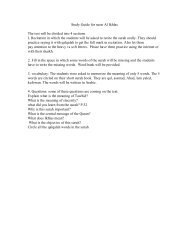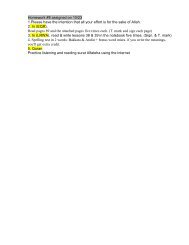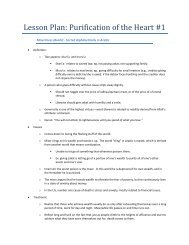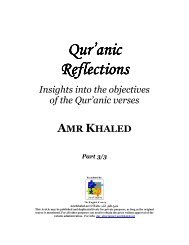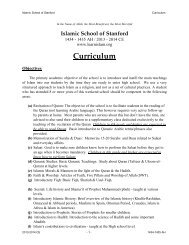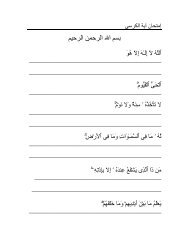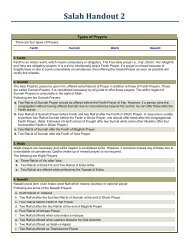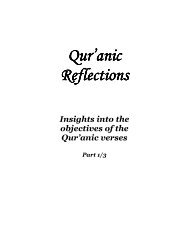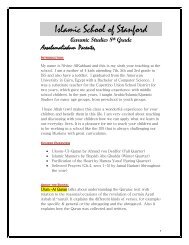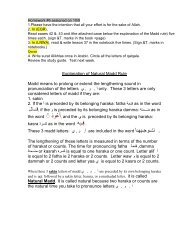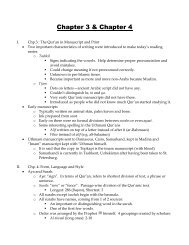Quranic Reflections - Islamic School of Stanford
Quranic Reflections - Islamic School of Stanford
Quranic Reflections - Islamic School of Stanford
Create successful ePaper yourself
Turn your PDF publications into a flip-book with our unique Google optimized e-Paper software.
Muhammad (SAWS); as if it invites us, the nation in charge <strong>of</strong> this Book, the Qur'an,<br />
to recognize its value and make sure not to let go <strong>of</strong> it like our predecessors did lest<br />
Allah (SWT) would replace us as He did with them.<br />
Make it your Imam<br />
Now, since we are roughly in the middle <strong>of</strong> our journey with explanation <strong>of</strong> the Ever-<br />
Glorious Qur'an, let us go through the surah and try to feel its greatness through its<br />
ayahs.<br />
The transfer <strong>of</strong> the Book through nations<br />
The surah starts with the Al-Isra'incident as Allah (SWT) says what can be translated<br />
as, “All Extolment be (to Him), Who made His bondman to set forth by night<br />
from the Inviolable Mosque to the Further (Literally: Remotest) Mosque,<br />
around which We have blessed...” (TMQ, 17:01). In the next ayah, Allah (SWT)<br />
says what can be translated as, “And We brought Mûsa (Moses) the Book...”<br />
(TMQ, 17:02). This ayah comes after the incident <strong>of</strong> Al-Isra’ to emphasize that<br />
mentioning it is to declare the transfer <strong>of</strong> the Scripture from Israelites to the nation <strong>of</strong><br />
Muhammad (SAWS). Thus, we find that the second ayah tackles the nation that had<br />
the scripture before as Allah (SWT) says what can be translated as, “and We brought<br />
Mûsa (Moses) the Book and We made it a guidance to the Seeds (Or: Sons) <strong>of</strong><br />
Israel) (saying), “Do not take to yourselves any trustee apart from Me” (TMQ,<br />
17:02). How did the scripture reach them Allah (SWT) says what can be translated<br />
as, “Offspring <strong>of</strong> whomever We carried with Nûh, (Noah) surely he was a<br />
constantly thankful bondman." (TMQ, 17:03).<br />
Hence, the three ayahs are a concrete representation <strong>of</strong> the transfer <strong>of</strong> the scripture<br />
among nations. What did they do with the scripture Why were they replaced The<br />
answer is in what Allah (SWT) says and can be translated as, “And We decreed for<br />
Seeds (Or: Sons) <strong>of</strong> Israel) in the Book: “Indeed you will definitely corrupt in the<br />
earth twice, and indeed you will definitely (become) exalted a great exaltation.”<br />
(TMQ, 17:04).<br />
The Ayahs from 4 to 7 go on to demonstrate how the previous nation did not assume<br />
its responsibility until we reach the pivotal ayahs that declares that the scripture is the<br />
responsibility <strong>of</strong> the Muslim nation. Allah (SWT) says what can be translated as,<br />
“Surely this Qur’an guides to (the way) that is more upright, and gives good<br />
tidings to the believers who do deeds <strong>of</strong> righteousness that they will a great<br />
reward, And (gives the tidings) that that the ones who do not believe in the<br />
Hereafter, We have readied for them a painful torment” (TMQ, 17:09-10).<br />
Therefore, cling to this Book, and let it be your shield, for it guides you, Muslims, to<br />
what is best for you.<br />
The record <strong>of</strong> the afterlife<br />
Amidst the speech about the Day <strong>of</strong> Judgment comes an ayah about the Book <strong>of</strong> the<br />
Day <strong>of</strong> Judgment, the Book <strong>of</strong> the good and bad deeds, in order to illustrate the<br />
destiny <strong>of</strong> those who do not stick to the Allah's Book on earth. Allah (SWT) says



